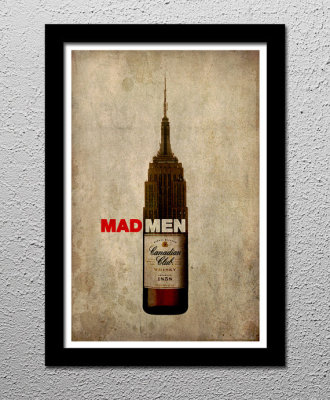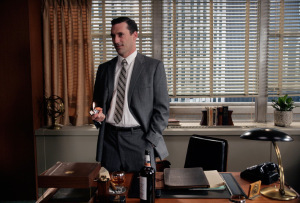YOU DID IT.
(You didn’t really think you could keep up that pace, did you? Only movie stars can do that sort of thing, and you see how movie stars look after a while, don’t you?)
Inevitably, you saw yourself doing things you never imagined. Kind of like a work in progress, a motion picture in your mind. Memories refract reality, where we see what we’ve done, or what we wished we’d done, or what we might have done, what we should not have done, what someone else may or may not have done, and what we may or may not have done if we were someone else. Mostly, we see things we don’t want to see, the things we try not to allow ourselves to see.
(Remember Duck Phillips? How about poor Freddie Rumsen? You pitied them, you thought about them, you tried, and failed, to forget about them.)
It doesn’t take too much to know you’re in trouble, and you knew it. I’ve seen it so many times. The difference between those who choose to help themselves and those who do not is that it’s only when one begins to actually care about trouble—and the things it has waiting around the corner—that one begins to reconsider things. And hope it’s not too late.
The only thing more addictive than what I have to offer is the habit of having conversations you can recall the next morning. You fall in love with anyone who will listen. If you’re lucky, you’ll fall, at long last, in love with yourself. If you can like yourself that’s a good enough start. You have to stop before you can begin, and that’s the secret of quitting, the only way to survive. Making promises you know you can keep? That’s a great way to make other people appreciate you and you get the hang of it in a hurry.
What did you want from me, anyway?
Did you think you could imbibe me and wash your sins away? Wine may have done that a long time ago, but that’s a whole different story. Transubstantiation is a hard sell and you, of all people, know about the hard sell. Could you sell it to someone? Can you sell it to yourself?
(Those who can, do. Those who can’t, quit.)
You’ll miss me, of course.
The good news: you’ll grow older, you’ll live.
The bad news: you’ll see who you used to be, an older man envying the self-satisfied hustlers rediscovering cocktails you thought you invented. And you’ll want to explain to them: We didn’t drink for amusement but to oil our engines, to fortify our infested souls. Bloodshot eyes weren’t a badge of honor; they were the price of admission.
You endured as best you could, but it was never for fun and it was never fashionable. Then one day you’ll watch young people ordering Old Fashioneds and thinking it’s nostalgic. It will make you miss Manhattan: your city, your drink, your self.
You’ll also miss the bad old days, when killing yourself to live was simply good business. That slow burn of similar nights, stiff upper lips, amphetamines and affairs, of forced smiles battling bottled tears in the bottom of a coffee mug, of ad men who could not manage the madness they made. It was a hard time when people didn’t live happily ever after, if they ever lived at all.
You will feel the past as you fear the future and understand the truth: this is the story of your life.




